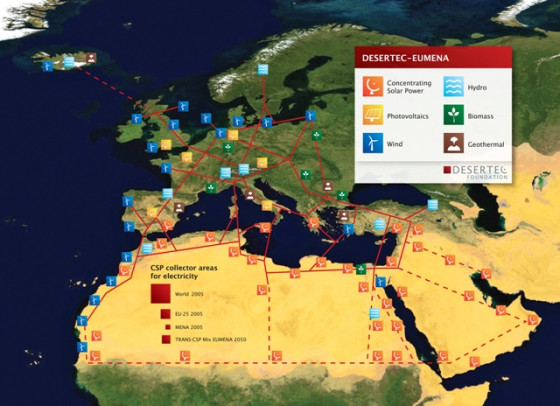The recent uprisings in North Africa have rattled the short-term prospects for a multi-billion dollar project to generate massive amounts of solar energy in the Sahara and ship a portion of it to Europe.
Long term, though, the establishment of new democracies throughout the region may set the stage for the project's long-term success, argued some participants at a project conference this week in Berlin, Germany.
"Socioeconomic development and the development of democracy go hand-in-hand," Kirsten Westphal, an energy expert at the German Institute for International and Security Affairs, told Spiegel Online.
In her view, the solar energy project would bring the kind of economic development that could consolidate democratic structures.
Harnessing the sun
The project, known as Desertec, would harness the abundant sun falling on the Sahara and use it to meet electricity demand across North Africa and Middle East, as well as 15 percent of Europe's.
The project calls for construction of solar thermal power plants in the Sahara and high-voltage transmission lines to ship the power to the people. Cost estimates are around $566 billion.
The concept is being promoted by the nonprofit Desertec Foundation and the Desertec Industrial Initiative, an industrial consortium consisting of such heavyweights as E.on and the re-insurer Munich Re.
At first, the solar power would be used locally, though eventually project promoters envision a portion shipped to Europe.
Such an ambitious project requires a certain level of stability in North Africa to be successful. Unrest scares off investors, for one, and providing extra security for the massive infrastructure would be too costly, noted conference participants.
Neocolonial hurdle
The Arab Spring, as the revolts to establish democracy across the Middle East and North Africa are called, represent the latest hurdle to the project, which has been questioned as too expensive and technically challenging to ever work.
In addition, the concept is seen by some as sort of neocolonialism — European nations coming into North Africa and the Middle East to siphon its resources for their own gain, Spiegel Online noted.
This type of fear isn't farfetched. Writing in the magazine Foreign Policy this week about the geopolitics of food, Lester Brown, president of the Earth Policy Institute, details how rich nations are already tying up land in developing countries to grow grain for themselves.
"Most of these land acquisitions are in Africa, where some governments lease cropland for less than $1 per acre per year … That the governments of [Ethiopia and Sudan] are willing to sell land to foreign interests when their own people are hungry is a sad commentary on their leadership," Brown writes.
According to the Spiegel Online article, attendees at the Desertec conference are well aware of the neocolonial fears and are encouraging an open and transparent process to show that their motives are honorable.
"Until the project takes shape, however, doubts are likely to remain," notes Spiegel Online. " 'Desert Power for the People' was the title of the Berlin event. But it's perhaps understandable if stakeholders in North Africa and the Middle East find themselves asking the question: Which people?"
More stories on green energy:
- Solar power from North Africa for Europe
- Europe's supergrid gets a boost
- Green machine takes root in Jordan
- Green energy ideas so crazy they might just work
John Roach is a contributing writer for msnbc.com. Connect with the Cosmic Log community by hitting the "like" button on the Cosmic Log Facebook page or following msnbc.com's science editor, Alan Boyle, on Twitter (@b0yle).
